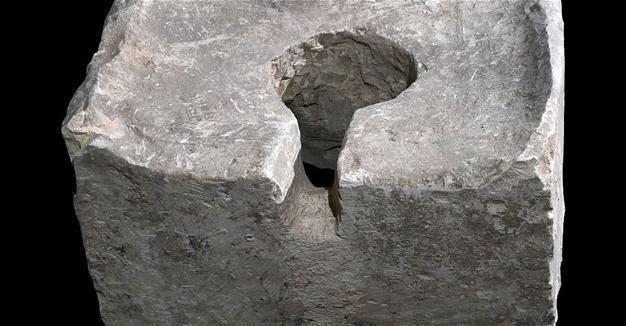Taboo toilet discovered at ancient Jewish shrine
JERUSALEM - Agence France-Presse

Israeli archeologists have discovered a stone toilet while excavating a Jewish shrine at an ancient city gate, they said Sept. 28, in evidence a biblical king tried to stamp out worship there. King Hezekiah deliberately defiled the eighth century B.C. shrine at the door to the ancient city of Lachish, as part of a campaign to centralize Jewish ritual in Jerusalem, the Israel Antiquities Authority said.
“A toilet was installed in the holy of holies as the ultimate desecration of that place,” the IAA said in a statement. “A stone fashioned in the shape of a chair with a hole in its center was found in the corner of the room.” The authority said it was the first time an archeological find confirmed the practice of installing a toilet to discourage worship, which is referred to in the biblical Book of Kings in an account of King Jehu’s fight against
worshippers of the pagan deity Baal. “And they demolished the pillar of Baal, and demolished the house of Baal, and made it a latrine to this day,” the statement quoted the Bible as saying.
But laboratory tests suggest the stone toilet at the Lachish gate was never used, the IAA said. This showed its placement was “symbolic, after which the holy of holies was sealed until the site was destroyed.” Lachish, about 40 kilometers southwest of Jerusalem, was conquered by the invading Assyrians under King Sennacherib in 701 B.C. The city gate was first located “decades ago,” the IAA said, but was only fully exposed in early 2016. “The excavation revealed destruction layers in the wake of the defeat, including arrowheads and sling stones, indicative of the hand-to-hand combat that occurred in the city’s gatehouse,” it said.
 Israeli archeologists have discovered a stone toilet while excavating a Jewish shrine at an ancient city gate, they said Sept. 28, in evidence a biblical king tried to stamp out worship there. King Hezekiah deliberately defiled the eighth century B.C. shrine at the door to the ancient city of Lachish, as part of a campaign to centralize Jewish ritual in Jerusalem, the Israel Antiquities Authority said.
Israeli archeologists have discovered a stone toilet while excavating a Jewish shrine at an ancient city gate, they said Sept. 28, in evidence a biblical king tried to stamp out worship there. King Hezekiah deliberately defiled the eighth century B.C. shrine at the door to the ancient city of Lachish, as part of a campaign to centralize Jewish ritual in Jerusalem, the Israel Antiquities Authority said.